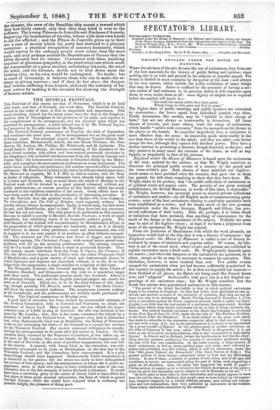THE MUSICAL FESTIVALS.
THE Festivals of this season are that of Worcester, which is to be held next week, and that of Norwich, the week after. The Norwich Festival, second in the order of time, is first in magnitude and importance. This music-meeting, indeed, has for many years been the first in the kingdom; equal to that of Birminkham in the greatness of its scale, and superior in the completeness of its arrangements and the classical spirit which has governed its management; a spirit infused into it by Mr. Edward Taylor, and preserved by his able successor Mr. Benedict. The Norwich Festival commences on Tuesday the 12th of September, and continues the usual time. All its arrangements are on the great scale of former years. The principal singers are Madame Viardot-Garcia, Ma- dame Castellan Mademoiselle Alboni, the two Misses Williams, Mr. Sims Reeves, Mr. LOckey, Mr. Phillips, Mr. Whitworth, and M. Lablache. The choral band is 270 strong; its nucleus consisting of the members of the local choral societies, (the ablest and best-trained provincial choristers in the kingdom,) with powerful reinforcements from the Ancient Concert and Exeter Hall: the instrumental orchestra is furnished chiefly by the Metro- polis; and comprises the most eminent performers on every instrument. The entire band, including solo performers, will number upwards of four hundred performers. Mr. Benedict is assisted in his duties by able provincial musicians; Mr. Harcourt as organist, Mr. L F. Hill as chorus-master, and Mr. Bray as leader of rehearsals. Many rehearsals have already taken place, both in London and Norwich; and, as usual there, the whole of Monday in the Festival week will be devoted to a great general rehearsal, without any public performance,—a custom peculiar to this festival, which has much conduced to the excellent execution of the music. Great efforts have al- ways been made at Norwich in the production of interesting novelties. It was for Norwich that the greatest works of Spohr—The Last Judgment, The Crucifixion, and The Fall of Babylon, were expressly written. But novelty cannot always be commanded; Spohr, it would seem, has laid down his pen, and Mendelssohn, alas! is dead. If they have left any successor, his star has not yet risen. The only piece to be performed on this occasion that can be called a novelty is Mozart's Davidde Penitents; a work of small magnitude, but exhibiting much of its immortal author's genius. The chief feature of the festival will unquestionably be Mendelssohn's Elijah, in the preparation of which great pains are bestowed; and, as it is already well known to almost every performer, vocal and instrumental, who will be engaged in it, we may expect it to produce an effect hitherto unequal- led. The oratorios are The Creation and Israel in Egypt; and Spohr's celebrated cantata, The Christian's Prayer, with several minor sacred com- positions will fill up the morning performances. The evening concerts will be of a much higher order than is usual at provincial festivals. They will contain ample selections from the Nome di Figaro, the Clonenza di Tito, the Matrimonio Segreto, and Fidelio with the entire Walpurgis Night of Mendelssohn, and a great variety of ;creel and instrumental pieces, in which lightness and elegance are consulted, without, in so far as we can judge from the programme, a single sacrifice to vulgarity or bad taste. The Worcester Festival—the triennial meeting of the three Choirs of Worcester, Hereford, and Gloucester—is this year on a somewhat larger scale than usual. The performers number about two hundred: Alboni is the principal foreign star; and the English principal singers are nearly the same as at Norwich. Elijah, too, is to be the chief feature of this meet- ing; though probably The Messiah, never omitted by " the three Choirs," will draw the most crowded audience. The programme presents nothing at all remarkable, and the performances are entirely under provincial di- rection. The Festival commences on Monday next. A good deal of attention has been excited by unsuccessful attempts of the Festival Committees, both at Norwich and Worcester, to obtain the assistance of Jenny Lind. Many weeks ago, she was offered the unpre- cedented sum of 1,0001. to sing at Norwich: the offer was declined in her name by Mr. Lumley; who, also in her name, sweetened the refusal by a donation of 2001. to the Festival fund. It appears also, that in December last, when Mademoiselle Lind was at Stockholm, the Bishop of Worcester wrote to her intimating the desire of the Committee to secure her services for the Worcester Festival. Her answer expressed willingness to comply, leaving the arrangements to be made after her arrival in London. On the question being renewed by the Worcester Committee, :it was taken up, on her part, by Mr Lumley; who, on her behalf, declined the engagement, as in the case of Norwich, on the score of previous engagements, but sent 501. to the charity. A concert, with Jenny Lind as the attraction, was sub- sequently announced to be given at Birmingham, on the first day of the Worcester Festival; and the Committee have remonstrated. It is a pity these things should have happened. Mademoiselle Lind's benevolence is as beautiful as her genius; but she seems too easily to have relinquished her powers of free agency; and the entrepreneurs, to whom she is under en- gagement, seem, in their own plans, to have overlooked some of the con- sideration due to the fair stranger, if not to the local institutions. It would have been a crowning glory in the career of Jenny Lind to have filled the first place at these great musical solemnities, the fame of which is spread through Europe; while she would have enjoyed what is evidently her greatest delight, the pleasure of doing good.


























 Previous page
Previous page